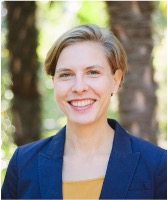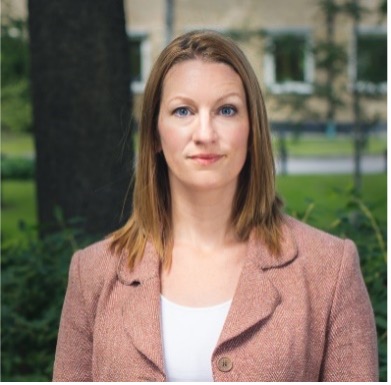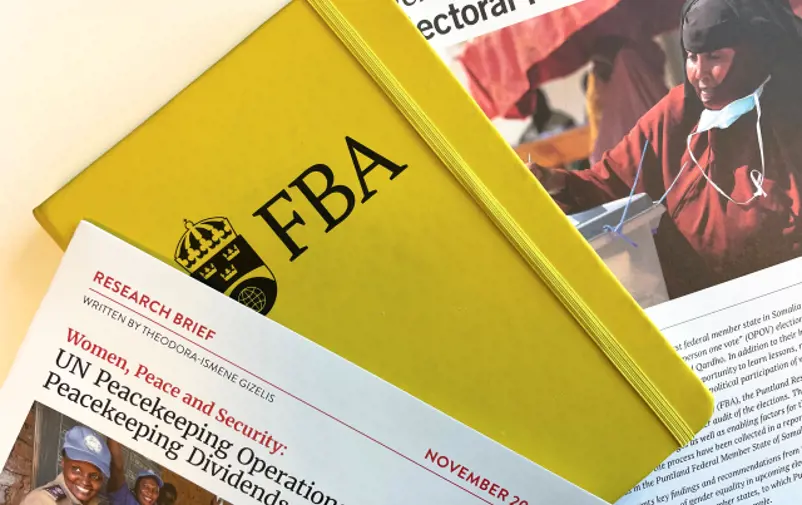Folke Bernadotte Academy’s Research Grants 2022 Announced
Folke Bernadotte Academy continues to support research on peace, security and development FBA annually finances research projects within the field of peace, security and development carried out by its members of the research working groups.FBA's research grants promote empirical research with high policy relevance. Since 2005, FBA has supported more than 150 research projects, including data collection, surveys and experimental research. Over the years, FBA's research-promoting efforts have enabled the publication of a significant number of scientific articles, books and policy relevant publications. Within the framework of this year's call for research grants, FBA has granted funding for four research projects.
"FBA's research grant aims to support pioneering research of relevance to work of FBA. This year, we have granted funds for research focusing on the legitimacy of peace processes, the transition of former armed groups to political parties, the effectiveness of peacekeeping operations, and the link between election-related violence and political participation, "says FBA's Head of Research, Dr. Johanna Malm.
Please find information about the projects that have been granted funding in this 2022’s round below:
Caroline A. Hartzell
Gettysburg College, USA
Project title: Citizens’ Perspectives on the Legitimacy of Civil War Peace Processes: An Experimental Conjoint Analysis
|
Project description Legitimate peace processes can be understood as those that garner “popular support both for the process itself – its specific initiatives and components – and for its outcomes, including a peace deal or political settlement” (Ramsbotham & Wennmann 2014, 6-7). The degree to which a civil war peace process is perceived as legitimate by a country’s citizens has been hypothesized to impact how sustainable the peace proves to be as well as whether the state subsequently is able to establish a just and durable political order (Clements 2014). Unfortunately, little research exists that allows for the exploration of causal claims regarding the effects that different features of the peace process have on citizens’ perceptions of the legitimacy of such processes. This project proposes to address this issue by conducting a choice-based conjoint experiment. The conjoint experiment, undertaken in Nepal, calls for respondents to rate several hypothetical descriptions of peace processes that have multiple attributes with the objective of estimating the influence of each attribute on respondents’ ratings. By providing insight into the features of peace processes that citizens deem most important and which obtain the most support, this research may serve to help countries seeking to end civil wars to structure more legitimate peace processes. |
Cyrus Samii
New York University, USA
Project title: From strong wartime collaborators to weak post-conflict electorate? Electoral support for former FARC in Colombia.
|
Project description Since the end of the Cold War, more than half of all countries emerging from civil conflict have held at least one post-conflict election in which a former insurgency participated as a political party (Manning 2016). The democratic integration of insurgents ideally decreases the potential for renewed political violence by providing peaceful channels for political expression and addressing grievances. However in nearly 30 % of these transitions these parties abandon the electoral process and re-militarize entirely (Daly 2020). Studying the conditions that help and hinder the electoral performance of these political parties is essential to promote their political integration and prevent future conflicts. In this project, we explore the determinants of the electoral return of political parties that arise from my insurgent movements. In particular, we study the relationship between exposure to conflict, civil interaction with ex-combatants, and electoral support for the party of the former rebel group. The case of Colombia provides a unique opportunity to study how former rebels campaign, how their way of interacting with communities has changed after the conflict, and how their electoral performance may affect their future support. Therefore, we propose to carry out a citizen survey and a field experiment in Colombia that captures these three elements for our study. On the one hand, we want to see if different types of experiences during conflict are related to different political strategies. For this, we start from the knowledge accumulated in recent years about variations in experiences of conflict in Colombia (Osorio 2022, Arjona 2016) and sample municipalities with different types of presence: peaceful, rebelocracy, and violent confrontations with other groups. On the other hand, we want to see if there is variation in the campaign strategy and interaction with the community for different types of municipalities. For this, in addition to the citizen survey, we will contact regional offices and candidates from the Comunes political party. Finally, through an experiment in selected municipalities, we want to study whether providing information about the electoral performance of the Comunes Party and the participation of its representatives in the Senate have an impact on the electoral return of the former rebel group's party. |
Inken von Borzyskowski
University College London
Project title: Urban Election Violence and Political Exclusion in Kenya.
|
Project description Electoral violence is a serious concern in many African democracies, particularly affecting urban populations. Violence during elections poses a significant security threat but also threatens to distort the quality of democracy. We study two interrelated questions: How does fear of election violence limit political participation in urban Africa? Who are the populations most vulnerable to political exclusion due to violence? We adopt a broad understanding of participation, extending beyond voting. We put particular emphasis on marginalized groups (gender, ethnicity, partisanship), hypothesizing that electoral violence perpetuates political inequalities. We use survey data combined with geo-coded demographic and electoral data to map fear of violence and political participation. The first leg of the project is currently being fielded in Lusaka (Zambia); this funding application is for a comparative study in Nairobi (Kenya). While both Kenya and Zambia have high levels of election-related fear, Kenya has higher levels of physical violence. The two cases will thus make for an important comparison. We hypothesize that fear of violence may affect electoral participation regardless of levels of manifest violence. The previous FBA funding committee appreciated the added value of the planned extension to Kenya, noting that both countries are “interesting and relevant cases.” |
Linnéa Gelot
Swedish Defense University (SEDU)
Project title: Peacekeeper performance and mission-host society interactions.
|
Project description What forms of peacekeeper traits and behaviours are most conducive to strong mission performance? A sophisticated body of research has established violence reduction as a key effectiveness criterion in UN peacekeeping, but this research field needs some renovation due to both geopolitical challenges facing multilateralism and the empirical growth of ‘partnership peacekeeping’ (Williams and Boutellis 2014; Sandler 2017). In most of today’s stabilisation and military intervention contexts regional organisations both authorise and implement peace operations, often as first responders and otherwise they often overlap with different types of UN mission presence (De Coning, Gelot and Karlsrud 2016). In these contemporary settings, we lack detailed empirical knowledge about what peacekeeper performance really means today. Our systematic mixed methods project will provide robust knowledge about what the civilian population –the primary beneficiary of any peace operation - think are the conditions and mechanisms that best explain peacekeeper performance of both UN and non-UN peacekeepers. We have selected three missions: UNMISS in South Sudan, UNISFA in Abyei, South Sudan, and AMISOM in Somalia. Project findings will enable generalisation about preferable peacekeeper conduct across the main entities of partnership peacekeeping. Specifically we strengthen earlier research about how peacekeepers traits and behaviours matter for creating and sustaining tactical level support (Gordon & Young 2017; Ruffa 2013; Howard 2019). We contribute both conceptually and methodologically by considering both the civilian and the peacekeeper side of the relational dynamics. |








 >
> >
>

